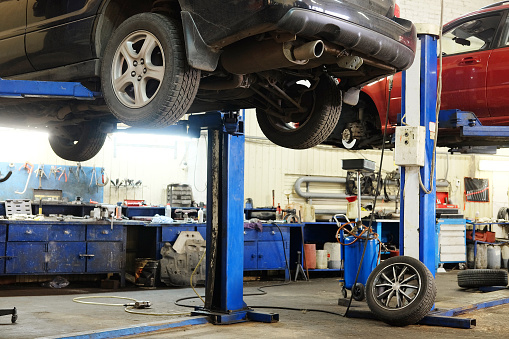All Categories
Featured
Normal engine tune-ups are essential for keeping your automobile's efficiency, enhancing gas effectiveness, and expanding its lifespan. Whether you're an experienced auto proprietor or a novice, recognizing the crucial elements of an engine tune-up can help you maintain your auto running smoothly for years. Here are some important ideas to lead you via the procedure.
- Change the Glow Plugs. Ignition system are small yet mighty components that play an important duty in stiring up the fuel-air mixture in your engine. Over time, they can wear or become fouled, leading to poor engine performance, reduced gas efficiency, and hard begins.
Throughout a tune-up, inspect your stimulate plugs for wear and replace them as essential. For a lot of lorries, ignition system need to be changed every 30,000 to 100,000 miles, relying on the type and material. Fresh ignition system ensure effective combustion and smoother engine operation.
- Evaluate and Change the Air Filter. The air filter is your engine's initial line of defense against dust, particles, and other contaminants. A blocked or dirty air filter can limit air flow, triggering your engine to work more difficult and eat even more fuel.
Check your air filter throughout a tune-up and change it if it's dirty or past its preferred solution period. A clean air filter enhances engine efficiency and improves gas economic situation.
- Examine the Fuel System. With time, your fuel system can accumulate dust and carbon deposits, decreasing engine efficiency and fuel performance. Cleaning the gas injectors and fuel lines during a tune-up assists preserve correct fuel delivery and combustion.
You can utilize a gas system cleaner or have a specialist mechanic carry out a more extensive cleaning. This action is specifically useful for older lorries or vehicles often driven in stop-and-go traffic.
- Examine the Belts and Hoses. Belts and hoses are essential for numerous engine functions, such as running the alternator, water pump, and cooling. During a tune-up, look for cracks, fraying, or indicators of endure these components.
Change any kind of worn-out belts and pipes to stop prospective break downs. A broken belt or leaking hose can cause engine overheating or loss of power, so resolving these issues immediately is crucial.
- Replace the Engine Oil and Oil Filter. Engine oil is vital for lubricating moving parts, lowering friction, and managing engine temperature level. With time, oil ends up being infected and loses its efficiency.
As part of a tune-up, replace the engine oil and oil filter. Use the sort of oil recommended by your vehicle's producer and stay with the suggested adjustment periods. Clean oil maintains your engine running smoothly and protects against premature wear.
- Check the Battery and Charging System. A healthy battery is important for beginning your auto and powering its electrical systems. Throughout a tune-up, inspect the battery's voltage and examine the terminals for corrosion. Tidy the terminals if required and guarantee a secure link.
Additionally, test the generator and charging system to guarantee your battery remains billed throughout procedure. If your battery is weak or old, take into consideration replacing it to avoid unexpected malfunctions.
- Flush and Re-fill the Coolant. The cooling system regulates your engine's temperature, stopping it from overheating. Old or contaminated coolant can lose its efficiency, bring about prospective engine damage.
Throughout a tune-up, flush the old coolant and replace it with a fresh mix. Additionally, evaluate the radiator, thermostat, and pipes for leakages or damages. Keeping the cooling system in excellent condition ensures your engine runs at the appropriate temperature.

- Address Caution Lights and Unusual Signs And Symptoms. Modern automobiles are outfitted with diagnostic systems that notify you to prospective concerns with control panel warning lights. If your check engine light or any type of various other warning signs get on, address them throughout your tune-up.
In addition, take notice of unusual symptoms such as odd noises, harsh idling, or reduced fuel effectiveness. An expert mechanic can diagnose and settle these problems during the tune-up process.
- Don't Forget the Exhaust System. Your car's exhaust system gets rid of damaging gases from the engine and makes sure appropriate emissions. Check the exhaust system for leakages, rust, or damages throughout a tune-up. A malfunctioning exhaust system can influence engine performance and bring about ecological and safety issues.
- Use High-Quality Parts and Fluids. When changing parts or rounding off fluids during a tune-up, constantly choose high-grade items that satisfy your lorry's specifications. Utilizing poor parts or incorrect liquids can negatively impact your engine's performance and long life.
Conclusion: Routine Tune-Ups Are Key to Engine Wellness. Taking the time to tune up your engine ensures it operates efficiently, conserves fuel, and lowers the threat of failures. Whether you execute these tasks on your own or depend on a trusted auto mechanic, normal tune-ups are an investment in your car's reliability and long life. Comply with these ideas, and you'll take pleasure in a smoother, more reliable ride for years to come.
Latest Posts
Reputable Expenses Door Solutions for Houses and Organizations
Discover Oil Changes & More: Complete Auto Care Solutions from Montclare Auto Repair
How Regular Auto Maintenance at Montclare Auto Repair Reduces Costs
More
Latest Posts
Reputable Expenses Door Solutions for Houses and Organizations
Discover Oil Changes & More: Complete Auto Care Solutions from Montclare Auto Repair
How Regular Auto Maintenance at Montclare Auto Repair Reduces Costs